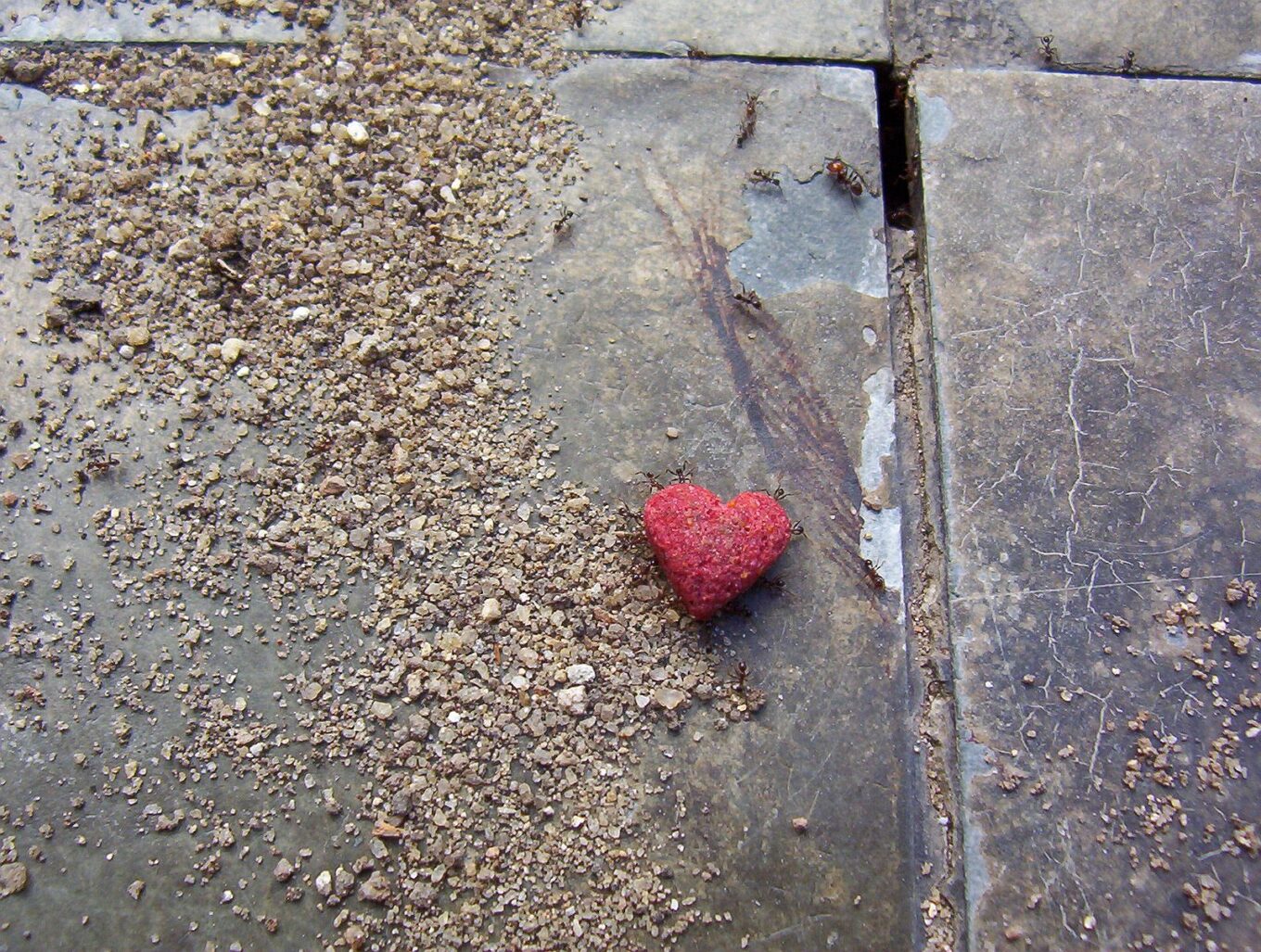One thing people don’t tell you about college is how quickly you have to get used to crying in public. In high school, I had the luxury of breaking down in my gray RAV-4 as I drove home at night, accompanied by only a heavy loneliness, or by myself in my room sitting across from a pile of homework. Any sense of privacy you have to be vulnerable in solitude is stripped from you once you start sleeping in a twin XL and sharing a bathroom with a complete stranger. By mid-semester my freshman year, I’d cried four times in the student health center, three times on my 15-minute walk back from class, twice in the library, and once at a corner table in the Noodles and Company downtown. I’d prayed that the people who walked by would just write my blurry, red eyes off as bad allergies and have their headphones loud enough to not hear the stifled whimper in my voice.
Over the years, I’ve rejected the art of vulnerability in front of others and instead focused on honing the craft of resistance. I’ve quickly followed any worry or concern up with a carefully practiced quip about how the issue will get resolved and I’ll be fine as always. I’ve only truly cried in front of my childhood best friend once in the entire span of our friendship. I’ve quite literally mimicked the famous Heisman pose on guys who have expressed their interest.
Sometimes I think that there is a knob somewhere deep inside of me that got twisted too tight, a wire that was pulled just a little too hard.
Writing undid all of that, though. Maybe my mom could sense that I needed a place to quietly unload my thoughts, so she bought me a small, purple journal that she left on my bed. “Sometimes, it’s easier to write than talk,” she had written on the inside. “If you have something on your mind that you don’t want to say out loud, write it down in this journal and leave it on my pillow. I’ll write you back and return it the next day.” I used that journal often, arriving at it like a soft landing, a place that was comfortable and light. With the newfound knowledge that I could transcribe my thoughts, I began writing even more, just for myself. I’d sit perched on my bed at night with paper and pen in hand, letting all those unsaid words and worries and wonderings fly out of my mind and onto the page. Writing quickly became an act of cracking open my chest, of gaining access to a heart that I had deadbolted and working to carefully undo the latch. The comfortable confines of my notebook’s smooth pages was the one place where I felt there was nothing to prove to anyone except myself. The only evidence of my vulnerability was the trace of black ink on the sides of my hands that I could scrub off in the morning.
I was distressed, then (to say the least), when I walked into my Intro to Creative Writing class on my first day of college to hear that one of our major assignments would be to write a personal creative nonfiction piece. I had known this was coming. I wasn’t naive enough to pursue a minor in Creative Writing and think that I wouldn’t be required to bare my soul at least a little bit in front of a classroom of strangers, but to think that the day was quickly approaching made my stomach turn a bit. As my professor explained how we would have to peer edit each other’s writing in person, the knot in my throat rose. I looked around the room to consider my peers. At nine in the morning, there was an eclectic mix: a handful of kids who were very obviously engineering majors and seemed like they couldn’t wait to get out of writing’s gray area and back into the comfort of black-and-white equations. A couple of frat guys in backwards hats and beat up sneakers who I thought might have accidentally entered the wrong classroom. A few people who looked like me, cautiously optimistic and unknowingly wide-eyed. I couldn’t decide if it was freeing that I had no prior relationship to these people and wouldn’t have to encounter them ever again after they read my writing, or if it was even more terrifying that strangers would be able to lay their eyes on something so revealing.
We write to attach meaning
to the way we’ve moved
about the world.
The assignment wasn’t due until the end of the semester, but I kept turning the topic over in my head for weeks. It was early September, and the leaves on the trees were still a confident green, bright flowers resting around them in full bloom. On the days when I walked easily back to my dorm as the sun slowly began its descent, I’d take careful notice of the flowers. I saw my great-grandmother in each one. She loved things that were undeniably beautiful and so she kept small potted plants in her room at the assisted living home. She passed away in late June, on the morning of my new student orientation. It was strange, that day, to realize that I was the only one in a room full of incoming freshmen who had any clue that I would never again visit my great-grandmother on Sunday mornings or hear her say that my outfit was “bee-you-tee-full.” She was ninety-four when she passed, and it’s not lost on me what a privilege it was to know her. In a way, though, my entire relationship with her was underscored by an anticipatory grief that I knew would someday come to fruition.
Now, walking around campus and taking in those flowers, I felt her loss like a dull ache that sank into my shoulders without warning. I turned this idea over in my head. How could I describe the simultaneous heaviness and gratitude, peace and anxiety that came with loving someone so old? There might have been safer options to share with the class, yes, like moving to a new state for college or discussing my childhood friends, but there was some part of me that realized writing about my relationship with her would bring a sense of closure I hadn’t yet gotten, a final act of grief, if there even was one.
Isn’t that what we do, though, when we write? We don’t write solely to craft something beautiful and unique, but rather to cement an experience in time and place, to attach concrete meaning to the way we’ve moved about the world.
I decided that if I was going to write about this ache that I felt and to mend it in some way, I’d have to commit to being utterly honest with myself. Go all in. So I sat in my dorm one night with the lights off and queued up all the songs about grief that had a hundred percent success rate of making me cry. I cried and I typed out everything that had been sitting like a paper weight on my heart, and while I didn’t wake up with black streaks of ink on my hands, I felt lighter, as though I could live in tandem with that small cloud of grief.
When the day finally came to share our writing, I was dreading having to sit in a circle and dissect word choice and the use of Hemingway’s Iceberg Theory in my narrative. My group included three other students, and we decided that we should all read our pieces aloud. My stomach flipped as I glanced around. No one was volunteering.

Photo by katerha is licensed under CC BY 2.0.
“I can go first,” I said, putting on a mock confidence. I pulled out my paper, cleared my throat, and began. It took me about five minutes to get through the entire piece. I kept my head down and eyes scanning intently at each individual word, too afraid of my peers’ reactions, of their ability to see the cracks in me.
I finally finished and looked up to see that the girl sitting across from me had tears streaming down her face. She used her pointer finger to wipe her waterline, blinking up at the overhead fluorescent lights.
“Oh my God,” I exhaled in surprise. “I’m so sorry, I didn’t want to make you cry!”
“No, no. That was just…I just thought it was really beautiful,” she said, sniffling. “And…it just really made me think of my own grandparents and how they’re getting older and…everything.”
I was in disbelief. My writing had never made a stranger cry before. In baring my soul, I was able to hold up a mirror to hers, sharing in an emotion that had felt indescribable until we had both allowed it to be felt. What a gift it was to be able to do that through words, strung together into sentences.
As I listened to other people read their work, I was amazed at how much we keep from each other in order to sustain a hard, perfect shell. I learned that the girl who sat next to me had watched her mother survive a disease that tried to claim her life from the inside out, that the frat boy in the back of the class was actually a pretty good poet and felt melancholic every time he encountered the smell of his old girlfriend’s perfume, and that the girl in the row in front of me was just as nervous as I was about starting college in a new place. As I listened to each one of my classmates crack open their own chests, even just a little bit, I came to understand that our vulnerability isn’t just for our own sake. It’s an undeniably uncomfortable feeling—admitting that we’re wrong, that we’re flawed, that we experience pain—but it’s a responsibility that we have to each other. We owe it to the strangers around us to share the unkempt, scary, and grief-stricken parts of our lives in the hopes that another person can find a sense of solace within their own.
Our vulnerability is the most difficult thing we’ll ever muster up the courage to articulate, but it’s also the greatest gift that we have to give to each other.
—
Abby Conrad is a sophomore at Penn State University majoring in Public Relations with a minor in Creative Writing. She hopes to pursue a career in corporate social responsibility. When she isn’t studying or trekking seven miles to and from her classes each day, she enjoys reading, running, and laughing with her roommates. She is determined to make her first-grade self proud by relentlessly following her dream of becoming a writer.
Cover image “Just a lonely heart…:))” by Morgana is licensed under CC BY-SA 2.0.



